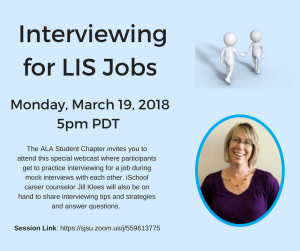When I expressed an interest in supporting the SLIS program on the San Jose State University campus with career development resources, I was quite naïve in what it meant to get an MLIS. I thought, like some of you just entering an MLIS program may be thinking, that one gains a Masters in Library and Information Science degree to work in a traditional library setting like the public or academic libraries I remember from my childhood. I wondered how many of these positions actually existed for graduates and how much support I could provide for them if there was only one career path? Let me just say: “I was wrong about the LIS field.” From a Career Counselor’s perspective, I have learned that there is much more to this degree than I first thought, and many career paths to choose from.
While many students do choose to work in a traditional library setting, their job is so much greater than just organizing books on shelves, checking out books to patrons, and researching where to find information. These current day librarians are tech-savvy information specialists who can find just about any piece of information a person is looking for. They are not only highly skilled in customer service but many of them are expected to speak another language in order to communicate with the diverse population of clientele our multi-cultural libraries cater to.
On the SJSU campus, I also provide career counseling to our students in the College of Engineering and the Department of Computer Science. I, of course, expected these students to be technologically adept and I clearly see how marketable their skills are to employers, particularly as the job market turns around, our economy improves, and more employers are hiring.
What I didn’t expect to learn was how many MLIS grads become experts in internet research and information retrieval and are knowledgeable about topics and areas that were quite foreign to me when I started, such as databases like LexisNexis, metadata, and different cataloging standards and systems. I didn’t know that they created wikis and lib guides, or that some are super tech savvy and understand programming languages like HTML, XML, XSL, and CSS file, or that some know how to embed web pages using PHP files or embed applications using JavaScript. I didn’t know that MLIS grads can create and maintain websites and blogs and that if you graduate from the SJSU SLIS program you are already skilled in online communication and collaborating in virtual environments. Many organizations are global or going global and the ability to work effectively with people at a distance sets SJSU SLIS students apart.
What I have written about so far just scratches the surface of what students in an MLIS program learn. I now understand the real value of this degree and the demand for this diverse skill set in the work place. More and more organizations outside the traditional library setting are seeing the value of this degree too. I see jobs titles like Information Resources Specialist, Technical Information Specialist, Director of Emerging Technologies, Digital Services Manager, Information Management Officer, Web Analytics Manager, Documentation Specialist, Intelligence Analyst, Acquisitions Team Lead, and Business Information Specialist showing up on job boards and search agents and the list of related job titles literally goes on and on. Notice that the word ‘librarian’ is not even mentioned in any of these titles.
So what I have learned is that the MLIS is an incredibly diverse degree. It can prepare graduates to work in a variety of traditional and non-traditional library settings doing work activities that involve a combination of working with people and with technology in an exciting and rapidly changing forum. From my perspective, this is a highly marketable degree and how you choose to market it depends on the skills you develop and the skills you choose to use in the work place.
And yes, I was wrong about the LIS field. If I were a student in an MLIS program today, I would approach my degree with an open mind. I’d embrace the opportunity to learn new technology and I’d take a variety of classes that matched my interests. I’d get involved in student organizations, professional associations, and challenging projects that stretched me outside of my comfort zone. I’d attend conferences and workshops to network and talk to people so I could learn about the vast LIS opportunities that are available. I’d pay attention to experts in the field to learn how I could best position myself for jobs upon graduation and I’d practice talking about what I’d learned in my coursework to demonstrate my marketable skills. I’d embrace the fact that I am embarking upon a rapidly changing industry and make the most of every class, every project, and every experience. And that is what I recommend for you too.

